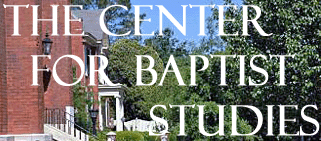|
Encouraging scholarship, strengthening faith identity, and interpreting contemporary issues in Baptist life. |
|||
 |
|
Baptist Freedom |
|
|
Home • Staff • Local Church • News & Views • Issues • Bulletin • Conferences / Seminars • Sabbaticals • Certificate • Links |
|||
|
by Dr. Bruce Prescott Until the year 2000, Baptists were adamant opponents of creeds. In 1791, Virginia Baptist leader John Leland denounced creedalism saying, "Uninspired, fallible men make their own opinions tests of orthodoxy, and use their own systems, as Procrutes used his iron bedstead, to stretch and measure the consciences of all others by." He added, "Supposing it was right for a man to bind his own conscience, yet surely it is very iniquitous to bind the consciences of his children -- to make fetters for them before they are born, is very cruel." Such sentiment makes it understandable why many Baptists were against writing down any doctrinal statements. In 1845, when the Southern Baptist Convention was founded, Baptists refused to write a statement of beliefs saying they would follow, "No creed, but the Bible." In 1925, when the SBC adopted its first "confession of faith" -- The Baptist Faith & Message (BF&M), it was distinguished from a creed by a statement insisting that it has "no authority over conscience" and ought "not to be used to hamper freedom of thought or investigation in other realms of life." In 1963, when the SBC first revised the BF&M, explicit clarification was added that said, "Such statements have never been regarded as complete, infallible statements of faith, nor as official creeds carrying mandatory authority." When the SBC last revised the BF&M, in 2000, the explicit clarification opposing creeds from 1963 had been removed and replaced by a statement asserting that Baptist confessions of faith are now "instruments of doctrinal accountability." Southern Baptists have clearly made an about face on the issue of creedalism. How did this happen and what are the fruits of creedalism in Baptist life? Power Politics In 1979 a coalition led by Paul Pressler and Paige Patterson organized a political takeover of the SBC. Their intention was to define strict doctrinal "parameters" and impose them on all the people employed by the SBC. To do that, they had to elect ten consecutive presidents of the SBC. After their presidents appointed only members of their coalition to serve as trustees of the boards and agencies, they would replace all the employees of the denomination with leaders and supporters of the coalition. Winning ten consecutive elections required that the coalition utilize the methods of power politics -- including the use of slander, deception, and lies. Mainstream Baptists opposed to the coalition's agenda became targets for character assassination. Malicious rumors and slanderous lies about Mainstream candidates could often be traced to telephone banks set up to get the vote out for coalition candidates. Creedalism's first fruit was rotten to the core. It generated the seeds that destroyed the mutual trust upon which our Christian fellowship is based. Fragmentation Once the Pressler-Patterson coalition had the power to enforce their agenda, and began to do so, the SBC began to fragment. The initial impetus that led to the formation of the Cooperative Baptist Fellowship in 1990 was the need to create a safety net for the Baptist institutions and agencies, such as the Baptist Joint Committee on Public Affairs and the International Baptist Seminary in Switzerland, that the Pressler-Patterson coalition was defunding and to lend temporary assistance to the Mainstream Baptist missionaries, educators, administrators, and denominational employees, such as the editors of Baptist Press, who were being terminated or forced into retirement or resignation. Later on, CBF launched new initiatives in missions and education that could give conscientious witness in accord with the conservative but non-creedal convictions of traditional Baptists. Dismayed by the exclusion and expulsion of traditional Baptists from the SBC, many Baptists began to view the Pressler-Patterson coalition's political activities in their states with alarm. Trustees at Baptist Colleges and Universities in several states began taking measures to protect their institutions from the possibility of a hostile takeover. Mainstream Baptists in Texas and Virginia created organizations that successfully prevented the takeover of their state conventions. More recently, Mainstream Baptists have created organizations in more than a dozen states and have launched a national Network of Mainstream Baptists to educate Baptist laity and churches about the machinations of the Pressler-Patterson coalition and the heretical creed they are imposing at every level of Baptist life. Thwarted in their attempts to takeover the state conventions in Texas and Virginia, the Pressler-Patterson coalition has pulled out of those state conventions and created competing state conventions that will be loyal to their agenda. In turn, Baptists in those states are reviewing their relationship with the SBC and reconsidering where scarce resources can best be allocated. Recently, the Texas convention reduced giving to the SBC's executive board, seminaries, and Ethics and Religious Liberty Commission by $5.3 million and redirected it to causes that Texas Baptists could conscientiously support. Oppression An economic and professional reign of terror exists wherever the Pressler-Patterson coalition has taken control. Journalists have been fired for writing factually accurate and balanced news reports, the head of every SBC institution and agency has been replaced along with thousands of employees, long-tenured professors have been forced to retire and younger professors forced to resign for refusing to sign their creed, and most recently, retired professors have been threatened with the loss of retirement benefits for criticizing their creed. Every sign of dissent becomes grounds for immediate and harsh reprisal -- as one seminary librarian discovered when he wrote a personal letter defending the previous administrations of his school from a factually inaccurate mischaracterization only to be terminated for "insubordination" ten months prior to his retirement. The reign of terror extends beyond the SBC to those state conventions and local associations that are controlled by the Pressler-Patterson coalition. In Oklahoma alone, the retired Executive Director of the state convention, who served for 25 years, was disciplined for writing a letter inviting pastors to attend a CBF meeting, a pastor was removed from a strategic committee for moderating a CBF discussion group, several prominent Mainstream pastors have been systematically excluded from state convention committee assignments and speaking opportunities, and churches that ordain women as deacons or ministers have been censured or not permitted to seat messengers at annual associational meetings. Not surprisingly, knowing that it is professional suicide to be a Mainstream Baptist in that state, the Mainstream pastors in Oklahoma call themselves "the dead pastor's society." Similar patterns of oppression could be recounted in every state under the control of the Pressler-Patterson coalition. The Great Divide The final phase of the Pressler-Patterson agenda began with the adoption of the 2000 BF&M. It pushes creedalism to the level of associations and local churches. For the Pressler-Patterson coalition, the 2000 BF&M lays down the law in Baptist life and the local associations are the denomination's law enforcement agencies. Every association that incorporates the 2000 BF&M into its constitution and by-laws, will have legal authorization to utilize the BF&M in creedal fashion over its member churches -- as an "instrument of doctrinal accountability." When coalition aligned associations complete their work, the SBC will be purged of Mainstream churches. Likewise, every church that incorporates the 2000 BF&M into its constitution and by-laws, will have legal authorization to utilize the BF&M in creedal fashion over its members -- as an "instrument of doctrinal accountability." When these churches complete their work, the SBC will be purged of all dissenting voices. The 2000 BF&M is truly the last straw -- the great divide in SBC life. It draws a line that traditional, non-creedal, Mainstream Baptists will not cross. Once a church adopts the 2000 BF&M, its pulpit will be closed to pastors with traditional, Mainstream Baptist convictions. For many, this is a harvest of bitter fruit. The best
that can be said is that the three decade long struggle for the pulpits
of Baptist churches is nearing an end. Ministers will eventually be
queried about their views on the 2000 BF&M and Mainstream pastors will
either find a congregation or plant a church that respects their free
and faithful consciences.
Go to Baptist Pamphlets Index
|
|||
|
The Center for Baptist Studies, Mercer University, 1400 Coleman Avenue, Macon, GA 31207 Phone (478) 301-5457 |
|||
